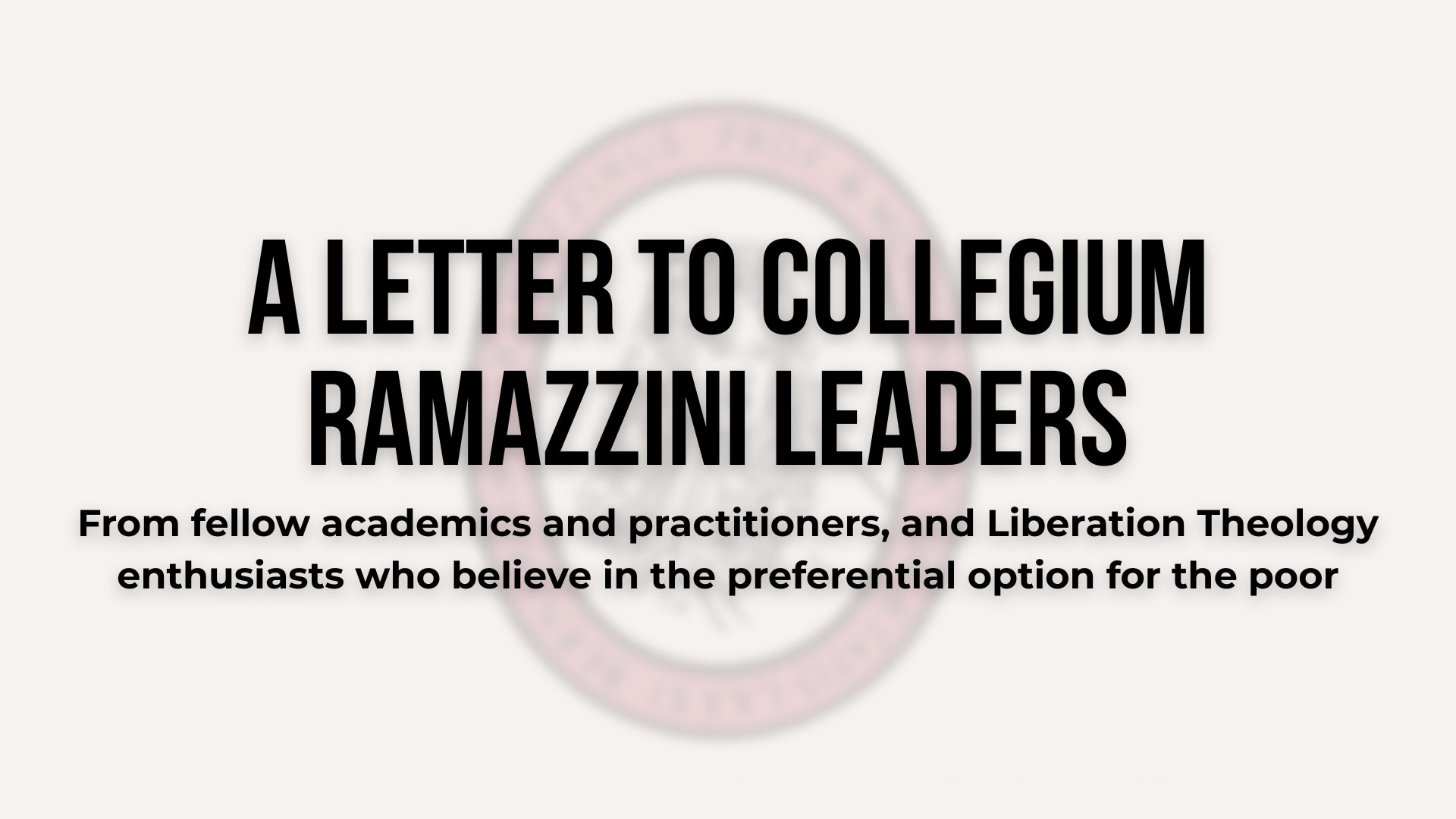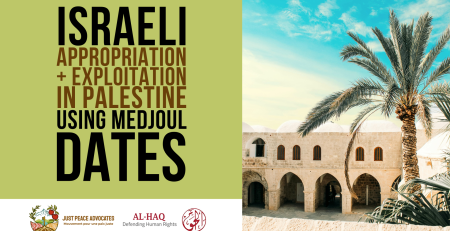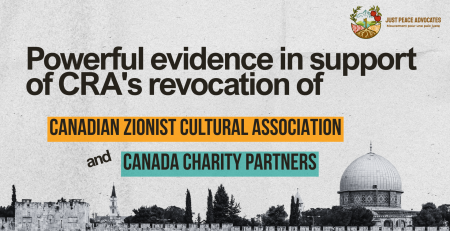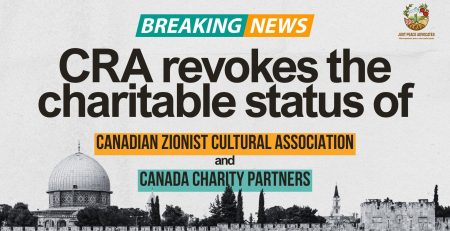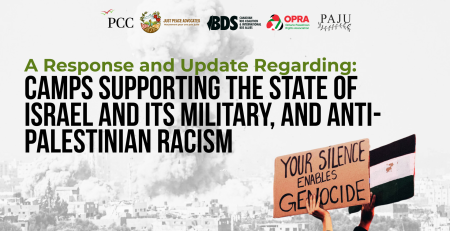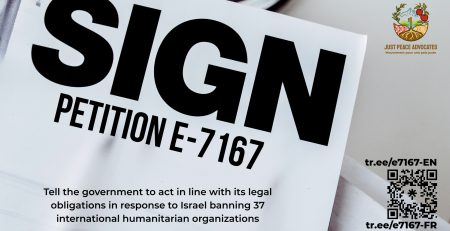Editor’s note: This post was originally published on September 8, 2025. It has been updated and re-published with new information as of October 9, 2025.
Just Peace Advocates co-founder and board member wrote to two Collegium Ramazzini leaders, on behalf of Friends of Sabeel North America. These letters, sent to Philip Landrigan and Andrea Vicini, are posted below. You can learn more about these circumstances by watching the webinar: “GAZA: What to do when your organisation turns a blind eye to injustice,” and hearing London Leslie, a Collegium Ramazzini fellow, speak to this issue.
On this page you will find:
Original letter to Landrigan — sent September 8, 2025
Original letter to Vicini — sent September 8, 2025
Response from Landrigan — September 9, 2025
Follow up to Landrigan — September 17, 2025
Follow up to Vicini — September 17, 2025
Official CR statement — Posted September 18, 2025
Updated letter to Landrigan — sent October 1, 2025
Updated letter to Vicini — sent October 1, 2025
Original letter to Landrigan
Dear Philip Landrigan,
We write to you today as fellow academics and practitioners and Liberation Theology enthusiasts who believe in the preferential option for the poor. We are reaching out from deep concern at the silence of medical and academic associations in the face of the genocide being carried out against the Palestinian people. This silence is being noted as significant, and unless it is changed it is likely to be noted with shame and embarrassment for years to come. Here is a petition launched by medical and academic leaders: STOP THE SILENCE! Academic Associations Must Recognise the Genocide in Gaza.
Here are just a few of the many articles published in medical journals on this moral failure:
· Break the selective silence on the genocide in Gaza;
· Genocide in Gaza: moral and ethical failures of medical institutions; and
· Editorial, Gaza has been failed by silence and impunity.
Medical and academic associations have issued strong statements condemning violations of international humanitarian law by Russia against Ukrainians. These same associations have, however, practiced a double standard and refused to condemn violations of international humanitarian law by Israel against Palestinians. It is not possible for organisations, pledged to uphold evidence and ethics, to then practice a double standard, protecting some lives but not others, protecting some children from horrific harm but not other children.
Thousands of children have been killed in endless bombing of homes and refugee camps in Gaza. Thousands more children have been maimed. Gaza has the largest number of child amputees than any other region in the world. Food, clean water and medical care have been denied, causing still more children to die from disease. Starvation is being used as a weapon of war.
As someone who is a world leading pediatrician and Director of the Program for Global Public Health and the Common Good, which is founded on evidence-based advocacy to advance population health and achieve social justice, we call on you to speak up.
The Collegium Ramazzini is a respected international organisation dedicated to upholding evidence, advancing occupational and environmental health and saving lives. Like other medical organisations, it has spoken out demanding that the lives of Ukrainians be protected under international humanitarian law but not the lives of Palestinians. We have reviewed your initial statement on the “Violence in Israel and Gaza.” This statement was insufficient and problematic, as Leslie London, Senior Specialist in Public Health at the School of Public Health and Family Medicine, University of Cape Town, South Africa and Fellow of the Collegium Ramazzini, pointed out in the webinar listed below, because it failed to mention the:
· Attacks on the healthcare system and targeting of healthcare workers;
· Destruction of civilian infrastructure and culture heritage sites;
· Enormous impact of Israel’s bombardment on the environment;
· Use of power and food as a weapon of war; and
· Perpetrator of the violence, making it seem that no-one was accountable
Along with members of other organisations, members of the Collegium Ramazzini organised two webinars, available on social media, GAZA: What to do when your organisation turns a blind eye to injustice, to share ideas on how to get the leaders of the Collegium Ramazzini and other medical organisations to end their silence and defend the lives of Palestinians and humanitarian workers in Gaza, as they did for Ukrainians.
As clergy, professionals, and academics, we ask you to consider your own words. In describing the Program for Global Public Health and The Common Good, Philip, you said:
“The program in Global Public Health and the Common Good at Boston College will align closely with BC’s educational and spiritual missions because public health is deeply rooted in a philosophy of social justice and ethics, strives to eradicate inequities in health, and embodies a preferential option for the poor”; and “…public health is also good for the soul. It is rooted in a philosophy of social justice, and one of its main goals is to end—or at least lessen—the sharp disparities in health that separate white from Black, rich from poor, and mainstream from marginalized. This is the gist of what I try to convey to my students.”
In January 2024, you and the Collegium Ramazzini Executive Council rejected requests from its members to stop turning a blind eye to injustice, stating that “another Statement would not be effective” and “no audience exists for further remarks on this topic.” We strongly disagree.
In 1945 Pastor Dietrich Bonhoffer was killed by the Nazis for refusing to stay silent. Here are his words: “Silence in the face of evil is itself evil: God will not hold us guiltless. Not to speak is to speak. Not to act is to act.”
As you know, the phrase “the preferential option for the poor” is rooted in liberation theology. As Gustavo Gutierez, one of the founders of liberation theology said, “The denunciation of injustice implies the rejection of the use of Christianity to legitimize the established order. And as another cofounder stated: “Being a theologian is not a matter of skilfully using methods but of being imbued with the theological spirit… liberation theology is a new way of being a theologian…Theology (not the theologian) comes afterwards; liberating practice comes first.”
As the Past President and a current member of the Executive Council of the Collegium Ramazzini, we urgently implore you to speak up and call on the Executive Council of the Collegium Ramazzini to speak up in support of the Palestinian people and against Israel’s ongoing genocide.
Please let us know your response on this urgent matter.–
Jonathan Kuttab
Executive Director FOSNA
Original letter to Vicini
Dear Andrea Vicini,
We write to you today as fellow academics and practitioners, and Liberation Theology enthusiasts who believe in the preferential option for the poor. We are reaching out from deep concern at the silence of medical and academic associations in the face of the genocide being carried out against the Palestinian people. This silence is being noted as significant and is likely to haunt us in the future. Here is a petition launched by medical and academic leaders: STOP THE SILENCE! Academic Associations Must Recognise the Genocide in Gaza.
Here are just a few of the many articles published in medical journals on this moral failure:
· Break the selective silence on the genocide in Gaza;
· Genocide in Gaza: moral and ethical failures of medical institutions; and
· Editorial, Gaza has been failed by silence and impunity.
Medical and academic associations issued strong statements condemning violations of international humanitarian law by Russia against Ukrainians. These same associations have, however, practiced a double standard and refused to condemn violations of international humanitarian law by Israel against Palestinians. It is not possible for organisations, pledged to uphold evidence and ethics, to then practice a double standard, protecting some lives but not others, protecting some children from horrific harm but not other children.
Thousands of children have been killed in endless bombing of homes and refugee camps in Gaza. Thousands more children have been maimed. Gaza has the largest number of child amputees than any other region in the world. Food, clean water and medical care have been denied, causing still more children to die from disease. Starvation is being used as a weapon of war. These are crimes against humanity and violate our fundamental religious beliefs which require us to care about others, especially the most vulnerable and especially children. We cannot and must not stay silent.
As a medical doctor with specialization in Pediatrics, as Chairperson of the Boston College Theology Department with expertise in moral theology and Christian ethics, and as co-chair of the international network Catholic Theological Ethics in the World Church, we call on you to speak up.
The Collegium Ramazzini, of which you are a Fellow, is an academy whose elected Fellows are internationally distinguished, intellectually independent physicians, scientists and advocates who have devoted their professional lives to the improvement of occupational and environmental health and who have embraced the habit of truth. The Collegium has reached out to persons of integrity in every continent. Like other medical organisations, it has spoken out demanding that the lives of Ukrainians be protected under international humanitarian law but not the lives of Palestinians. We have reviewed your initial statement on the “Violence in Israel and Gaza.” This statement was insufficient and problematic, as Leslie London as Leslie London, Senior Specialist in Public Health at the School of Public Health and Family Medicine, University of Cape Town, South Africa and Fellow of the Collegium Ramazzini, pointed out in the webinar listed below, because it failed to mention the:
· Attacks on the healthcare system and targeting of healthcare workers;
· Destruction of civilian infrastructure and culture heritage sites;
· Enormous impact of Israel’s bombardment on the environment;
· Use of power and food as a weapon of war; and
· Perpetrator of the violence and circumstances.
Along with members of other organisations, members of the Collegium Ramazzini organised two webinars, available on social media, GAZA: What to do when your organisation turns a blind eye to injustice, to share ideas on how to get the leaders of the Collegium Ramazzini and other medical organisations to end their silence and defend the lives of Palestinians and humanitarian workers in Gaza, as they did for Ukrainians.
As clergy, professionals, and academics, we ask you to consider your own words. You stated: “How do we address such inequalities in health globally? First, we need to be aware that injustice is pervasive. Second, we must avoid desperation or complacent resignation; awareness of unacceptable disparities should animate social engagement to address and eliminate them. Third, it is necessary to make a preferential option for those who bear the brunt of these inequities. Scholars who embrace key tenets in Catholic social teaching, for example, do not shy away from calling such an engagement ‘a preferential option for the poor’ and for the needy, the disadvantaged, and the marginalized.”
In January 2024, the Collegium Ramazzini stated that “another Statement would not be effective” and “no audience exists for further remarks on this topic.” We disagree.
In 1945 Pastor Dietrich Bonhoffer was killed by the Nazis for refusing to stay silent. Here are his words: “Silence in the face of evil is itself evil: God will not hold us guiltless. Not to speak is to speak. Not to act is to act.”
As you know, the phrase “the preferential option for the poor” is rooted in liberation theology. As Gustavo Gutierez, one of the founders of liberation theology said, “The denunciation of injustice implies the rejection of the use of Christianity to legitimize the established order. And as another cofounder stated: “Being a theologian is not a matter of skilfully using methods but of being imbued with the theological spirit… liberation theology is a new way of being a theologian…Theology (not the theologian) comes afterwards; liberating practice comes first.”
As an influential member of the Collegium Ramazzini, you are accountable for what the organisation says in your name.
We urgently implore you to speak up and call on the Executive Council of the Collegium Ramazzini to speak up in support of the Palestinian people and against Israel’s ongoing genocide.
Please let us know your response on this urgent matter.
—
Jonathan Kuttab
Executive Director FOSNA
Response from Landrigan
Dear Jonathan
Thank you for your email. By an overwhelming margin, the Fellows of the Collegium Ramazzini have approved a statement on Gaza. It will be posted on the Collegium Ramazzini today or tomorrow
Sincerely
Philip J. Landrigan, MD, MSc, FAAP
Director, Program for Global Public Health and the Common Good
Director, Global Observatory on Planetary Health
Professor of Biology
Schiller Institute for Integrated Science and Society
Boston College
Follow-up to Landrigan
Dear Philip Landrigan,
Thank you for your email of September 9 telling us that a statement on Gaza had been approved by the Fellows of the Collegium Ramazzini and would be posted on the Collegium Ramazzini website on September 9 or 10.
The statement has not yet been posted on the Collegium Ramazzini website.
I deeply hope that the Collegium Ramazzini’s statement on Gaza demands that the lives of Palestinians be protected and condemns Israel for its violations of international humanitarian law in the same way as the Collegium Ramazzini issued a statement demanding that the lives of Ukrainians be protected and condemning Russia for its violations of international humanitarian law.
As I emphasized in the letter I previously sent you, it is not possible for an organization such as the Collegium Ramazzini, that pledges to uphold evidence and ethics, to then practice a double standard, protecting some lives but not others, protecting some children from horrific harm but not other children, sending a message with this double standard that the lives of Palestinian children do not matter.
In my letter to you of September 8, I urgently implored you to speak up in support of the Palestinian people and against Israel’s ongoing genocide. I trust that the Collegium Ramazzini’s statement on Gaza does so.
World-respected human rights organizations and experts, world-respected organizations and experts on genocide, including Jewish organizations and Jewish experts, have identified Israel’s actions as constituting genocide. It is not possible to close one’s eyes to this reality and maintain any credibility. I deeply hope that you and the Collegium Ramazzini will uphold justice and not betray the lives of those who are being oppressed and subjected to genocide.
Sincerely,
Jonathan Kuttab
Executive Director FOSNA
Follow up to Vicini
Dear Andrea Vicini,
We are very troubled that you have not responded to the letter we sent you on September 8. In our letter, we urgently implored you to speak up in support of the Palestinian people and against Israel’s ongoing genocide.
As a member of the Collegium Ramazzini, as a medical doctor with specialization in Pediatrics, as Chairperson of the Boston College Theology Department with expertise in moral theology and Christian ethics, and as co-chair of the international network Catholic Theological Ethics in the World Church, we are surprised at the double standard and silent complicity that the Collegium Ramazzini has practiced for the past 19 months while thousands of Palestinian children have been killed, maimed, starved, denied water, denied medical care and subjected to apartheid and ethnic cleansing.
The Collegium Ramazzini issued a statement demanding that the lives of Ukrainians be protected and condemning Russia for its violations of international humanitarian law but has rejected requests that it issue a similar statement demanding that the lives of Palestinians be protected and condemning Israel for its violations of international humanitarian law. Do the lives of Palestinians not matter?
World-respected human rights organizations and experts, world-respected organizations and experts
on genocide, including Jewish organizations and Jewish experts, have identified Israel’s actions as constituting genocide. It is not possible to close one’s eyes to this reality and maintain any credibility.
Delay and silence are not acceptable. We ask you to promptly send us your response on this urgent matter.
Sincerely,
Jonathan Kuttab
Executive Director
Official CR statement
Collegium Additional Statement Regarding the War in the Gaza Region
Updated letter to Landrigan
Dear Philip,
You stated that “By an overwhelming margin, the Fellows of the Collegium Ramazzini have approved a statement on Gaza.” This “statement” is utterly depraved. The over one-page statement assiduously avoids the use of the terms genocide, apartheid, ethnic cleansing, or even the word Palestinian. The mental gymnastics of equating the “suffering” of the unnamed Palestinian population with the handful of hostages ( currently only soldiers) is truly heroic. What you describe as a statement, is a dehumanizing compilation of propaganda and genocide apologetics.
The principles of liberation theology are extinct in this statement, Liberation Theology, as you have recognized in the past requires standing with the poor, the vulnerable and the oppressed. In your statement, you stand with the oppressors, and the powerful. You may take this position if you want, but do not call it “liberation theology”.
Sincerely,
Jonathan Kuttab
Updated letter to Vicini
Dear Andrea,
Despite your silence, I have reviewed the statement posted on the CR website. This “statement” is utterly depraved. The over one-page statement assiduously avoids the use of the terms genocide, apartheid, ethnic cleansing, or even the word Palestinian. The mental gymnastics of equating the “suffering” of the unnamed Palestinian population with the handful of hostages ( currently only soldiers) is truly heroic. What you describe as a statement, is a dehumanizing compilation of propaganda and genocide apologetics.
The principles of liberation theology are extinct in this statement. The essence of liberation theology is standing with the poor and the oppressed, not with the powerful, the oppressors, and the established order. Your statement lags behind the neutral international bodies who clearly labelled the genocide. It shows neither courage nor principle. You may take taht position if you choose, but do not call it “liberation theology”
Sincerely,
Jonathan Kuttab

